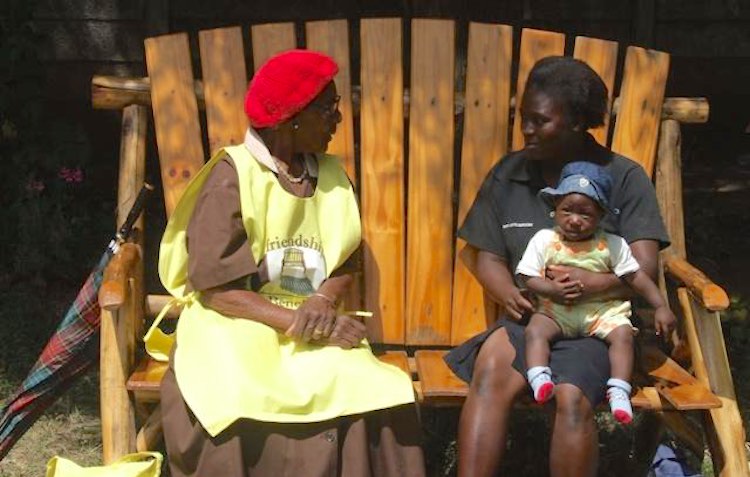Their office hours are spent on simple wooden seats, called Friendship Benches, on the grounds of mental health clinics around Harare and other major cities in Zimbabwe.
The practitioners are ordinary citizens—lay health workers known as community “Grandmothers”— trained to listen and offer support to patients living with anxiety, depression and other common mental disorders.
RELATED: Simple Checklist Leads to 82% Drop in Mental Health Patient Suicides
Six months after undergoing six weekly “problem solving therapy” sessions on the Friendship Benches, participants showed significant differences in severity of depression, anxiety, and suicidal thoughts based on locally validated questionnaires for depression and anxiety: the Shona Symptom Questionnaire (SSQ), the Patient Health Questionnaire (PHQ) and the Generalized Anxiety Disorder scale (GAD). The results were striking.
Patients with depression or anxiety who received problem-solving therapy through the Friendship Bench were more than three times less likely to have symptoms of depression after six months, compared to patients who received standard care. They were also four times less likely to have anxiety symptoms and five times less likely to have suicidal thoughts than the control group after follow-up.
CHECK OUT: New Drug Inspires Hope For Alzheimer’s Cure
50% of patients who received standard care still had symptoms of depression compared to 14% who received Friendship Bench (based on PHQ). 48% of patients who received standard care still had symptoms of anxiety compared to 12% who received Friendship Bench (based on the GAD), and 12% of patients who received standard care still had suicidal thoughts compared to 2% who received Friendship Bench (based on SSQ).
The Friendship Bench intervention was also shown to be well suited to improve health outcomes among highly vulnerable individuals. 86% of the study’s participants were women, over 40% were HIV positive, and 70% had experienced domestic violence or physical illness.
MORE: President of Gambia Bans Female Genital Mutilation
While about 25% of the country’s primary care patients suffer from depression, anxiety and other common mental disorders, Zimbabwe (population 15 million) has only 10 psychiatrists and 15 clinical psychologists.
“Common mental disorders impose a huge burden on all countries of sub-Saharan Africa,” says Dr. Chibanda. “Developed over 20 years of community research, the Friendship Bench empowers people to achieve a greater sense of coping and control over their lives by teaching them a structured way to identify problems and find workable solutions.”
To date, over 27,500 people have accessed treatment.
“In developing countries, nearly 90 percent of people with mental disorders are unable to access any treatment,” says Dr. Peter A. Singer, Chief Executive Officer of Grand Challenges Canada. “We need innovations like the Friendship Bench to flip the gap and go from 10% of people receiving treatment, to 90% of people receiving treatment.”
In 2017, the team will focus on expanding the model to reach other vulnerable populations, including youth and refugees. In partnership with the Swedish NGO SolidarMed, the team intends to expand implementation of this model in Masvingo province and subsequently in the refugee centers of the eastern highlands on the border with Mozambique.
SHARE the Great Idea – OR, (Photo by Grand Challenges Canada/ZAPP)




















